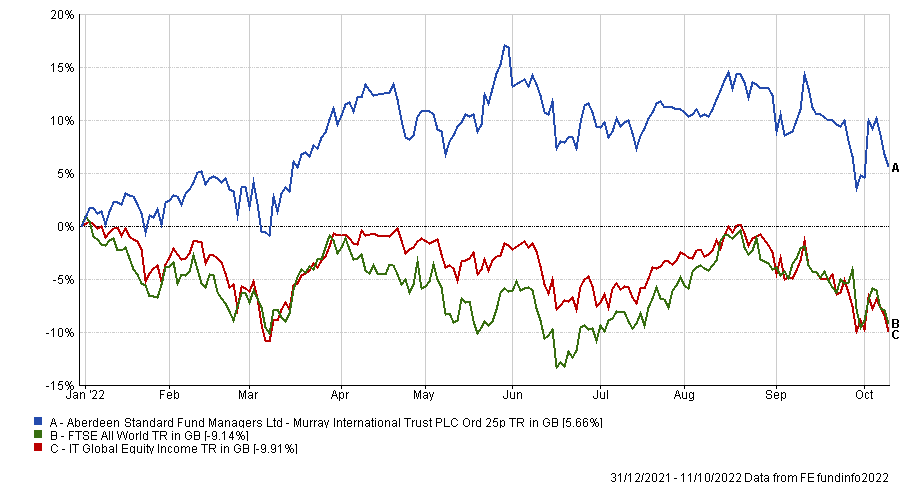Investors could have much longer to wait before the market reaches ‘peak fear’, according to investment trust veteran fund manager Bruce Stout, who said the falls this year have been “rational” rather than “indiscriminate”.
This year markets have dropped on the back of rising inflation and interest rates, war in eastern Europe and a general slowing of the global economy.
Add to this the recent rise in right-wing politics and the move away from globalisation, and the world seems more fractured than it has been for decades.
This concoction has led to a poor year for markets, with the FTSE All World down 9.1% while the average IT Global Equity Income trust has lost 9.9%. Yet Stout’s Murray International trust has gained 5.7% in 2022 so far.
Total return of trust vs sector and benchmark YTD

Source: FE Analytics
Despite the market falls, there could be much worse yet to come, as the manager said we are still some way from the “peak fear” that usually indicates the bottom of the market and the start of an upswing.
“As long as we are having a conversation in a rational manner, then I would say we have not yet reached peak fear. When you get the real stress points, people do not want to talk about it. People do not want to look at their portfolios or at valuations,” he said.
Stout said that the final two months of 2008, when the market made consecutive double-digit losses, was a good example of “indiscriminate selling”.
“We have not had any of that yet. A lot of the selling now has been around the tech names in the US, which are down 60-70%. That’s irrelevant. Look where they were. I don’t know why the valuations were that high but they might still be 100% or 200% too expensive because there might not actually be a good business there,” he said.
“I do not think it is peak fear. There is no indiscriminate selling. There is rational selling. You have to wait until the month comes along where it really does feel horrible and you think we shouldn’t be doing this.”
One way that investors can tell if markets are overreacting is through the bond market, which Stout said might be a better indicator of sentiment than equities. If people rush into traditional havens such as the US dollar or Treasuries, then this is a sign of peak fear.
The last time investors acted irrationally like this was in March 2020 when the Covid pandemic sent markets into shock.
Stout said this was much harder to judge, however, as there were no tangible signs of improvement, rather the hope and “leap of faith” that the pandemic would end.
“Covid was the hardest work we have ever done, because the others were tangible. At least you had the property collapses during the global financial crash,” he said.
During this time, Murray International owned a significant holding in emerging market debt, which held up well during the March and April, but the manager reduced the exposure during this time to add to American growth companies that fallen so low that they were yielding as much as 7% – a great opportunity for the income portfolio.
“When we did it, it felt awful. Your instinct is to preserve capital. The bonds we owned were not going down, so the safe thing to do would have been to hold on to them, but you’ve got to sell and get into the stuff that’s fallen,” said Stout.
This opportunity has yet to arise this time around, but the manager is looking at high-quality industrials that have fallen but will be around in the next cycle.
Hugo Ure, co-manager of the Troy Income & Growth trust, said he did not know whether the market had reached peak fear, but that things may get worse.
“I don’t know. I don’t think we would try to call peak fear. There is quite a long way to go before that sense of revulsion appears. People are still trying to work out what is cheap – they haven’t banned the equity market in total,” he said.
Ure added that things “felt a lot worse” during the financial crisis and the peak of the pandemic but said there was no guarantee that sentiment would worsen now.
“Things can get worse. Whether they will or we will be bailed out by central bankers cutting rates I don’t know. It may be that this proves to be peak fear for this bit of the cycle,” he said.





